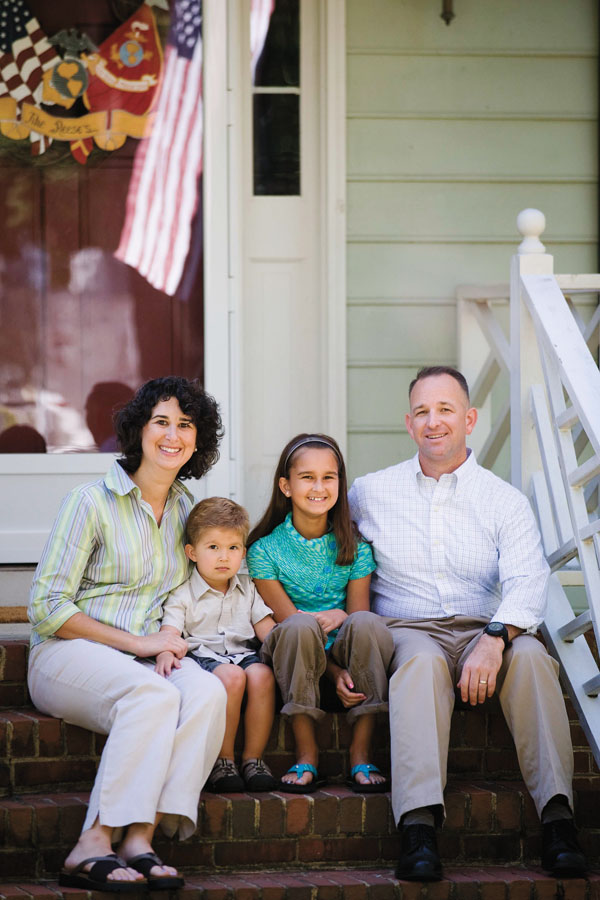Alumni Gazette
 AT HOME: The Reeses pose on the front steps of their Fredericksburg, Va., home, where Travis spends weekends. During the week, he’s at Camp Lejeune, N.C., with the 2nd Marine Logistics Group. (Photo: Kevin Wolf/AP Images for Rochester Review)
AT HOME: The Reeses pose on the front steps of their Fredericksburg, Va., home, where Travis spends weekends. During the week, he’s at Camp Lejeune, N.C., with the 2nd Marine Logistics Group. (Photo: Kevin Wolf/AP Images for Rochester Review)When Travis ’96 and Alia Blau Reese ’95 welcomed their first child, Emma, in 2002, they both knew that Travis would be absent for long periods during Emma’s earliest months and years. When the family settled in Camp Lejeune, N.C., a month after Emma was born, Travis was required to spend one to three weeks at a time, at regular intervals, in Virginia Beach, preparing for deployment to Afghanistan as part of the 22nd Marine Expeditionary Unit. The deployment came when Emma was 18 months old.
“I’ll never forget,” says Alia, of the day the postman rang the doorbell two weeks after Travis’s departure. “Emma comes running down the stairs—‘Daddy, Daddy!’ She was attuned to Travis coming home every two weeks, so she thought it must be him.”
“Another guy in a uniform with his name on his shirt,” Travis sighs.
Emma was crushed. But over time, due to deliberate steps both Travis and Alia had taken, she would have a chance to shift her focus from her father’s physical absence to the ways in which she and he remained connected.
Many of those steps involved pictures and stories. Before he left on his deployment, for example, Travis had recorded himself reading 25 of Emma’s favorite bedtime stories. When Travis was away, Alia says, “Emma and I followed along with the books while we listened to Travis read.”
Alia and Travis also ensured that Emma would have plenty of pictures of her father—and not just any snapshot, but pictures of him engaged in his work. Pictures, in other words, that Alia could point to and talk to Emma about what her father did.
Travis and Alia repeated these routines when their second child, Samuel, was born in 2009 and Travis continued on regular deployments.
Late last year, Alia became, as she calls herself “an accidental entrepreneur.” After earning a master’s degree in psychology and working to help other military families, she created Heart Star Press and released the first two books in its American Hero Books Series: My Daddy Is a Marine and My Mommy Is a Marine.
The books grew seamlessly out of the scrapbooks she’d created for Emma and Samuel. They contain simple images and text. An “insert your own picture” format allows young children to superimpose pictures of their parents over the books’ stock images. In September, the Military Writer’s Society of America awarded My Daddy Is a Marine a Gold Medal for Best Children’s Book. Alia says her American Hero Series will eventually include books for each of the military service branches as well as civilian first responders such as police, fire, and rescue personnel.
While the books honor the work of military mothers and fathers, that’s not their only intent. Their ultimate purpose, says Alia, is to maintain a bond between a small child and a parent who is absent for stretches of time. And as both Alia and Travis emphasize, to say that the books are about connection is no minor point.
Both have found that many books for the children of service members focus on separation.
“We know on a daily basis when he’s not there. We don’t need a reinforcement of the common experience,” says Alia. “It actually furthers a negative emotion.”
Travis emphasizes that death or injury “is not the majority experience. The majority experience is that dad goes somewhere far and works very hard, or mom goes somewhere far and works very hard, and then they come back.”
“The main concept,” says Alia, “is what does mommy or daddy do every day?”
Alia and Travis met in a River Campus dining hall. Alia was on the rowing team, and Travis was in the NROTC program. “We were the only groups ever in the dining hall in the early morning,” says Alia.
They shared a circle of friends, but never dated at Rochester. It wasn’t until two years after Alia’s graduation when, as she lingered over lunch with another Rochester classmate, Travis’s name came up. On a whim, they gave him a call. Alia and Travis talked, emails followed, and then visits.
“It turned out we liked each other better as professionals and grownups than we did in school,” Travis says.
With Travis away as often as he is, their challenge is not just to keep him present in the lives of their children, but to be a constant presence in each other’s lives as well.
The Reeses now live in Fredericksburg, Va. They have a routine of their own. And, like the ones they kept with their children, it’s age appropriate.
“When I come home off deployment,” says Travis, “we spend basically two weeks in a honeymoon mentality. Third week, we argue for a week straight as I’m reacclimating to life here and Alia is reacclimating to having me back at home.”
Alia is used to being on her own. “When he comes back into the house and he sees the kids doing something or me doing something and he thinks it should be done a different way,” she says . . .
. . . “that’s a source for dialogue!,” Travis bellows, laughing.

